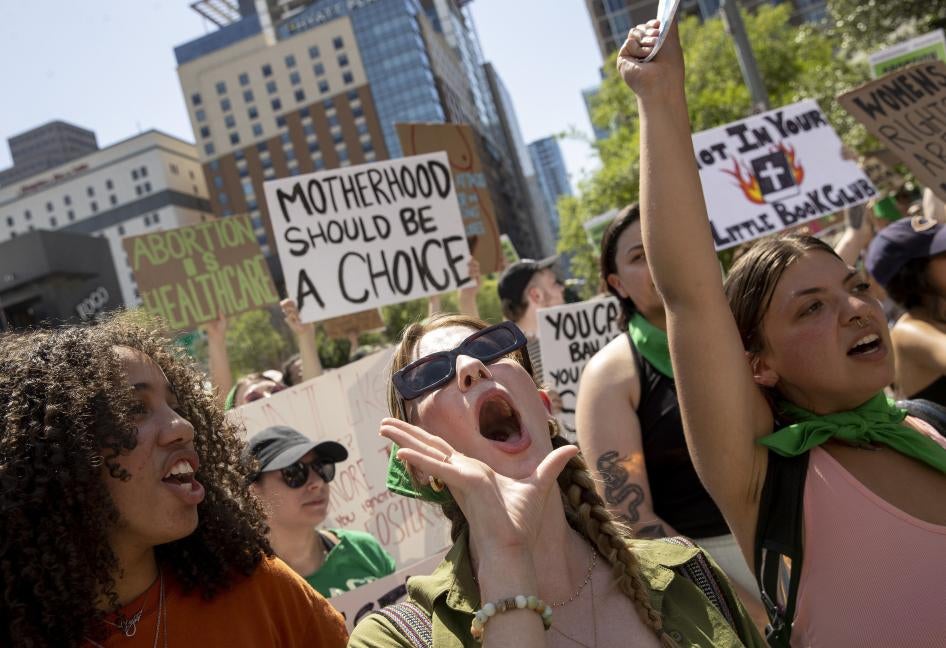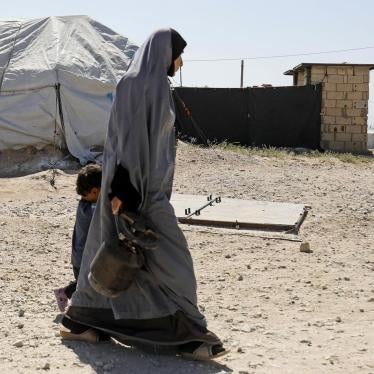The United States administration of President Joe Biden made slow human rights progress in 2022, but bolder policies are needed to dismantle systemic racism, counter rollbacks to reproductive freedom, and tackle other pressing rights concerns, Human Rights Watch said today in its World Report 2023.
“The US government needs to meet the critical human rights issues of the moment,” said Tanya Greene, US program director at Human Rights Watch. “Officials at all levels need to take on the systemic racism, economic inequality, suppression of voting rights, and restrictions on reproductive freedom that are leaving people of color and other communities more vulnerable to abuses than ever.”
In the 712-page World Report 2023, its 33rd edition, Human Rights Watch reviews human rights practices in close to 100 countries. In her introductory essay, acting Executive Director Tirana Hassan says that in a world in which power has shifted, it is no longer possible to rely on a small group of mostly Global North governments to defend human rights. The world’s mobilization around Russia’s war in Ukraine reminds us of the extraordinary potential when governments realize their human rights obligations on a global scale. The responsibility is on individual countries, big and small, to apply a human rights framework to their policies, and then work together to protect and promote human rights.
The Biden administration and Congress took a positive step to safeguard human rights in October by passing the Inflation Reduction Act. The landmark law, despite some shortcomings, advances the right to health and is the most significant US action yet to address the climate crisis.
Still, US officials have not taken effective steps to dismantle the systemic racism that pervades US society. The landmark reduction in poverty starting in 2021 is reversing following the federal government’s failure to renew Covid-19 pandemic-related social spending such as the Child Tax Credit – and its failure to enact structural reforms to address the racial disparities that persist in access to adequate health care, water, education, employment, and housing. Wealth concentration among the top 1 percent is on the rise, as Black, Latinx, and Native American households experience poverty rates that are more than double those of white households.
While the government needs to invest in supportive services to address myriad societal problems, a number of lawmakers have made unfounded or exaggerated claims about rising crime to justify growing law enforcement expenditures at the expense of supportive services. Data shows that people of color remain vastly overrepresented in jails and prisons, and the police kill Black people at three times the rate they kill white people per capita. Congress has not passed even the weak reforms proposed in the federal Justice in Policing Act.
US democratic institutions have failed to consistently protect key fundamental rights, including the right to vote free from racial discrimination. Nearly half of US states passed more than three dozen laws in 2021 and 2022 making it more difficult to vote. Similarly, the failure of judicial or legislative authorities to check some officials’ use of white supremacist rhetoric and racist policies has further undermined US democratic institutions.
“The dangers posed by the US government’s failure to grapple with the pervasive legacies of settler colonialism and slavery, and to take real action to fix structures that perpetuate racism throughout US society is serious and worsening,” Greene said. “Racial injustice violates the rights of millions of people living in the US and poses an existential threat to US democracy.”
Despite increased public recognition that many deeply entrenched racial disparities are linked to the legacy of enslavement, including with the unprecedented support in Congress and progress on reparations’ initiatives at the state and local levels, the administration and Congress failed even to create a commission to study the legacy of enslavement and develop reparations proposals, Human Rights Watch said.
Systemic racism is also linked to harsh immigration policies, Human Rights Watch said. The Biden administration finally ended the so-called Remain in Mexico program after a period of forcing non-Mexicans to wait for their asylum hearings in dangerous Mexican cities, but continued to expel thousands of migrants at the southern US border through the abusive Title 42 Covid-19 restrictions, disregarding their right to seek asylum. In Texas, Governor Greg Abbott targeted suspected migrants for arrest and incarceration under Operation Lone Star, a discriminatory and abusive $4 billion border policy.
Although Biden’s announced pardons for citizens convicted of simple marijuana possession in the federal system is progress, the administration’s pardons did not include otherwise-eligible non-citizens.
The US Supreme Court repeatedly demonstrated a disregard for protecting fundamental rights. In June, the court overturned the nearly 50-year constitutional guarantee of abortion access; more than half of all US states have since or are poised to ban abortion. Structural racism in health care and other factors make abortion a form of reproductive health care needed by women of color at higher rates than white women. Racism in the criminal legal system means that women of color are most at risk from abortion bans and pregnancy criminalization – actions interpreted as harmful to a person’s pregnancy.
By undermining the constitutional right to privacy, the reversal of Roe v. Wade also threatened LGBT parental rights, same-sex marriage, and consensual same-sex conduct. State lawmakers introduced more than 150 bills that threaten the rights and health of transgender people, particularly transgender children.
Covid-19 claimed thousands of lives, especially people in marginalized groups, with more than 230,000 people in the US dying from the disease in 2022. Biden’s statements, including declaring the pandemic “over” in September, reflect the ongoing inconsistency in the US pandemic response.
Without Democratic Party control of both Houses of Congress, Biden will need to take stronger action to address the racial and economic inequities that are exacerbated by inflation and climate change and create a federal reparations commission, Human Rights Watch said. The authorities at all levels should end abusive law enforcement and border policies, protect reproductive freedom, and safeguard everyone’s rights.









